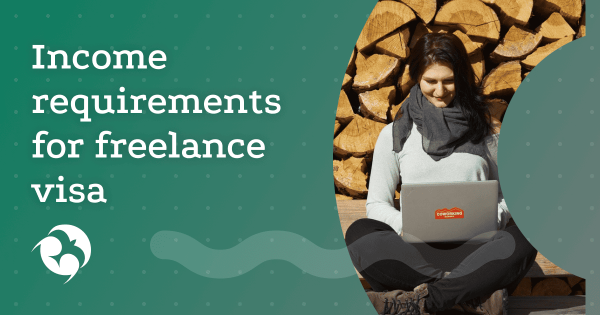The pandemic has led to the development of remote work formats and the launch of the Digital Nomad program for foreign specialists. Now, not only freelancers but also full-time employees are not tied to an office and can work remotely in various countries around the world. Additionally, a long-term digital nomad visa provides the opportunity to receive tax and social benefits of residents, with the prospect of applying for permanent residency and citizenship.
Income Requirements for Digital Visas in Europe
Each country has its own requirements for foreign specialists. The applicant needs to fill out a questionnaire and gather a standard dossier:
- a document of cooperation with a foreign company;
- an employment contract;
- a company registration certificate;
- a financial statement from a bank/corporate account;
- proof of monthly income for the past 3 months;
- a cover letter;
- a receipt for the fee payment;
- a health insurance policy.
Entrepreneurs should provide service contracts and tax documents. Due to periodic amendments to immigration laws, the list should be clarified on the website of the embassy of the immigration country before collecting documents.
Based on data from ministries providing digital nomad visa programs, a ranking of the TOP 5 countries with minimum salary requirements for obtaining a visa was compiled. Without taking into account the amount of deposits in accounts and the condition of moving a mono-nomad, the rating was topped by Germany with a minimum income of €2,500.
Best Destinations for Digital Nomads
As of early 2024, more than 40 countries in Europe, Latin America, and Asia were issuing self-employed visas and freelancer residence permits for 12-24 months. This list also includes 9 Caribbean countries. Professionals from Russia can still travel to Seychelles, Cape Verde, Mauritius, and Namibia. Russia, along with the UK, Canada, and Germany, is recognized as one of the “nomadic” countries of the world. Let’s delve into the requirements of different countries.
Germany
The EU country offers the Freelancer Visum for the self-employed and entrepreneurs under the name Gewerbetreibender. IT workers, lawyers, media, and science and technology specialists can apply for Freiberufler. Entrepreneurs need to convince the authorities that their business project will be beneficial to the national economy.
After amendments that came into effect in April 2024, obtaining a Blue Card opens the path to citizenship after 3 years. For a freelance residence permit, one must have a relevant education diploma and a stable monthly income of €5,000.
A unique feature of the program is the absence of income limits, but the applicant for Gewerbetreibender needs to document cooperation with two clients residing in Germany. By law, income from one client should not exceed 83% of the total income. In addition to a passport, application, business project, and portfolio, a deposit statement of €12,000 or a monthly profit of €2,500 is required.
Italy
In the spring of 2024, the country launched the Digital Nomad program for remote work. It opens the way to obtaining a residence permit for one year, with the prospect of moving with family via a family reunification visa. At the end of the term, tax residents who have lived without leaving for six months can apply for an unlimited number of extensions.
Employees from third countries, self-employed individuals, and individual entrepreneurs can participate in the program. They obtain residency after proving collaboration with a Russian or any other company not registered in the Italian registry. During their stay, nomads are only allowed to collaborate with foreign legal entities. The key condition for participation is an income of €2,700 or a deposit of €30,000.
Spain
Since 2023, the country has had a program for digital nomads, the Telework Visa, under the Startup Law. It became part of a series of reforms aimed at improving the business climate, implementing a plan for digital optimization and telecommunications. The migration law allows foreigners to submit their files upon arrival in Spain. With a permanent employment contract with a foreign legal entity, specialists are eligible for a freelancer’s residence permit for 3 years. Unlike other countries, nomads in Spain can receive up to 20% of their income from a local employer.
Requirements: a standard file, a degree in computer technology, an income of €2,520. If the applicant’s family is moving with them, the limit increases. An additional €950 is required for an adult and €315 for each child. If earnings are below the established threshold, a statement from a deposit account will suffice. For a family of 3, the monthly amount is €3,970.
Portugal
This program is for freelancers, investors, and startup entrepreneurs. Remote workers are issued a residence permit with an income of €3,280 per month, equivalent to 4 minimum wages in Portugal as of early 2024. For a second spouse, an amount of €9,920 is required, plus €2,429 per child. For a family of 3, a total of €17,220 is needed. Family members are included in the application for an accompanying visa.
Upon relocation, applicants must attach a motivation letter and a bank statement proving financial solvency to the main package of documents. The Portuguese Digital Nomad program allows legal work for 2 years, with the option to extend for another 3 years, provided they have lived in the country for 16 months. It grants foreigners equal social rights with residents and includes benefits.
Greece
Employees, self-employed individuals, and businesspeople are legally entitled to apply for digital nomad status for 2 years with an extension option. Entrepreneurs must document their activity and business registration with apostilled documents and attach a cooperation contract with 2 foreign individuals. Employees must present employment contracts with legal entities, petitions, and cover letters.
Documents are accepted at Consulates General and the Department of Foreign Affairs in Greece. Family members receive visas along with the applicants. The program is open to applicants with an income of €3,500, considering the financial ability to cover family expenses. An additional 20% or €700 is required for a second spouse, and 15% or €525 for a child. The monthly amount for a family of 4 reaches €5,250.
Montenegro
The Balkan country is considered one of the best for remote work in the global digital community. The Digital Nomad Visa is issued for 24 months with one extension for 2 years. The freelancer’s residence permit provides social benefits and exempts from income tax.
Residence permits are issued to entrepreneurs for establishing IT startups, self-employed individuals, and freelancers. Conditions for employees to obtain status include an employment contract with a foreign company, no contracts with local employers, and a stable income of €1,350. This amount is equivalent to the average 3-month salary of Montenegrin citizens. Family members can also apply for residency along with the applicant.
Hungary
On the White Card, equivalent to a nomad visa, specialists related to digital technologies, people in creative and technical professions from an approved list, as well as businessmen earning income abroad, are eligible to apply. Employed workers are issued a White Card provided they earn at least €2,000 per month before taxes.
It does not grant the right to permanent residency, cooperation with Hungarian legal entities, or tax exemption. To obtain permanent residency and a new job, a visa type change is required based on renting or purchasing property. The family reunification program is not provided. The second spouse can move to Hungary provided they obtain a separate visa.
Romania
Freelancers, employed foreigners from third countries, entrepreneurs, and businessmen who registered a business outside Romania 3 years ago are eligible to apply for nomad status. The Digital Nomad visa allows temporary residence for up to 12 months with the possibility of obtaining a residence permit. Nomads can extend their stay for a year or more. After 10 years of naturalization, foreigners can apply for citizenship. After 6 months, expats are automatically assigned the status of tax residents, obligating them to pay 10% of their income.
According to the program, applicants with employment contracts in 2024 must earn at least €4,287 per month, confirmed by an income statement for the last 6 months.
France
There is no unified status for foreign specialists in the country. Freelancers are granted the Profession libérale visa, and those arriving with a talent passport are granted the Passeport talent visa. The third on the list is the Vacances-Travail or working holiday visa. Authorities believe a differentiated approach to professions is more rational. It allows for the simultaneous development of the economy, culture, and business. Visas of different categories allow foreigners to stay in France for up to a year.
Authorities impose strict financial guarantees on candidates. The income amount must not be lower than the minimum wage of €1,747. Otherwise, financial security must be confirmed with a bank statement. The required amount is €21,000. Differentiated payments are provided for participants in the Passeport talent program. However, applications for status are only accepted after presenting a business project with an investment of €30,000.
Croatia
The visa is issued to foreigners in Russia and Croatia, employed by foreign companies conducting business via the internet. To obtain nomad status, one needs to confirm the purpose of their stay and entrepreneurs must attach a copy of the company’s registration. The period of stay is limited to 12 months.
To open a new residence, one needs to leave the country for six months and reassemble the documents. When moving to Croatia, employed workers must provide proof of earnings of at least €2,870. In case of opening a visa for a spouse and child, the minimum threshold increases by 10%. For a family of 3, it is €3,730. If monthly income is below the limit, the nomad visa is issued only if there is €34,400 in a deposit account.





